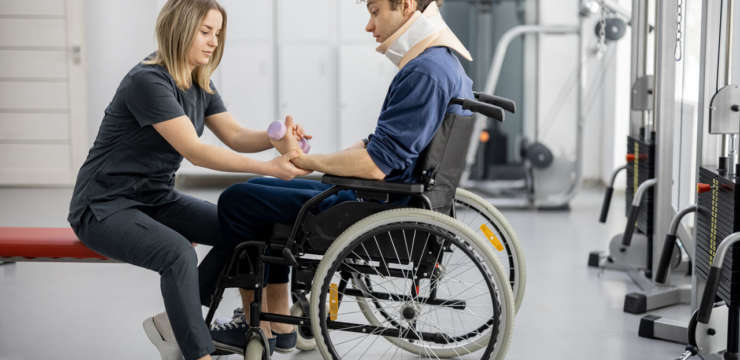Gain knowledge on somatovisceral disorders from head injuries. Uncover symptoms, causes, and effective management strategies. Understanding Head Injuries and Their Impact on the Brain-Body Connection…


Gain knowledge on somatovisceral disorders from head injuries. Uncover symptoms, causes, and effective management strategies. Understanding Head Injuries and Their Impact on the Brain-Body Connection…

Maximize your recovery with proper sleep after TBI. Understand its importance for cognitive recovery and physical healing. Why Sleep Is the Most Important Part of…

Unlock the secrets of functional wellness for brain health. Learn tips to enhance your cognitive abilities and mental well-being. Unlocking the Brain-Body Connection: How Neurological…

Uncover the relationship between stress and traumatic brain injury to better protect your mental and physical health. Understanding Traumatic Brain Injury: Navigating Stress, Recovery, and…

Chiropractic care can help manage migraines and head injuries. Discover its benefits for improved health and comfort. Understanding Traumatic Brain Injury (TBI): Headaches, Migraines, and…

Discover innovative approaches in chiropractic care for TBI that can lead to significant symptom relief from tinnitus. Traumatic Brain Injury and Hearing Problems: Understanding Tinnitus,…

Nutritional guidelines for head injuries are essential for recovery. Discover the foods that support healing and overall well-being. Introduction TBI, or traumatic brain injury, is…

Traumatic brain injury can change lives. Learn about its effects and the best practices for rehabilitation and support. Introduction Globally, traumatic brain injury (TBI) is…

Can individuals with insomnia find various ways to reduce its effects, such as a full night’s rest and promoting healthy sleep habits? Insomnia Many people…

Can neurological physical therapy help individuals diagnosed with a recently acquired or chronic neurological condition gain strength and functioning? Neurological Physical Therapy Neurological physical therapy…

The legs are important for standing and motion. Various problems can affect any part, including the bones, tendons, joints, blood vessels, and connective tissues of…

Reflex pain is a complex condition that involves the body’s pain withdrawal reflex failing to turn off after the event that triggered the pain, so…

Sciatica is a radiculopathy, which is irritation of the nerve as it exits the spine and is typically caused by compression/pinching along the nerve’s path.…

The sciatic nerve is the largest in the body and is created by five nerve roots that come together and exit the lower spine. It…

When it comes to Neuromusculoskeletal disorders, many techniques are available for one to learn. Some of these techniques include:Â
Activator methodsÂ
Applied Kinesiology
Atlas SpecificÂ
Meric SystemÂ
Network ChiropracticÂ
Pro-AdjusterÂ
And Many MoreÂ
As a healthcare practitioner, upwards of 90% of your consultations involve a clinical investigation. The most often asked questions to patients include “How long have you had the pain?†and “What aggravates the pain?†However, it is imperative to determine the best course of treatment for patients. To properly do this, you do a functional history that includes all dimensions of wellness, not just physical and pain. These questions include:Â
Past Medical HistoryÂ
Occupational StatusÂ
Social StatusÂ
Medication HistoryÂ
Surgical HistoryÂ
Identifying non-neuro muscular disorders the patient may have like diabetes, fibromyalgia, rheumatoid arthritis, and cancerÂ
Understanding all areas of injury is vital due to neurological referred pain. Neurological referred pain occurs when signals get mixed in your neurological wiring. Sensory inputs from different areas of the body combine into single neurons (the nerve cells) in the spine. In the spine, they are integrated and modified before being sent to the brain. To properly assess and have successful treatment, one must identify the proper tissue that has been compromised.Â
Along with this, there are perpetuating factors that can lead to downfalls as well.Â
Mechanical Stresses
The stresses that directly impact pain and the skeletal system include short leg, hemipelvis, long second metatarsal, short upper arms, postural stresses, misfitting furniture, poor postures, abuse of muscles, and immobility.Â
Short leg is seen frequently and puts a biomechanical strain on the supporting muscle. This creates a distortion of axial alignment. The main muscle impacted is the quadratus lumborum. This muscle being compromised is one of the most overlooked sources of low back pain. Once this is identified, the shoulder girdle should be evaluated next. If individuals are suffering from low back pain frequently, nutritional inadequacies should be considered.Â
There are research studies done showing nutritional deficiencies to be associated with chronic neuromusculoskeletal system disorders. For optimal health, we focus on the body down to the orthomolecular components. These include:Â
B1
B6
B12
Folic Acid
Vitamin C
CalciumÂ
PotassiumÂ
IronÂ
MagnesiumÂ
InBody
Part of obtaining a full history is having patients undergo an InBody scan. This scan focuses on body composition and inflammation. It provides a full report of water, percent body fat, phase angle, visceral fat, basal metabolic rate, ECW/TBW and contains multiple segmental analysis sections. The InBody 770 high power technology to accurately assess patients.
[embedyt] www.youtube.com/watch?v=WwbIsPNUYqs%5B/embedyt%5D
Â
THE HUMAN BODY IS VASTLY INTERTWINED AND HEALTH CARE PROVIDERS SHOULD BE LOOKING AT EVERY AREA IF YOU ARE EXPERIENCING PAIN OR DISCOMFORT. A DETAILED HISTORY CAN HELP DOCTORS GET TO THE ROOT SOURCE OF YOUR PAIN. -KENNA VAUGHN, ACSM-EP, SENIOR HEALTH COACHÂ
References:Â
Dr Ron Grisanti,D.C “Insiders Guide.†Functional Medicine University (FMU).Â
Williams FH. Neuromuscular complications of nutritional deficiencies. Phys Med Rehabil Clin N Am. 2008 Feb;19(1):125-48, vii. doi: 10.1016/j.pmr.2007.10.006. PMID: 18194754. Â
Additional Online Links & Resources (Available 24/7)


Â
Online Appointments or Consultations:  https://bit.ly/Book-Online-Appointment


Â
Online Physical Injury / Accident Intake Form: bit.ly/Fill-Out-Your-Online-History


Â
Online Functional Medicine Assessment: bit.ly/functionmed
Â
Â
Disclaimer
Â
The information herein is not intended to replace a one-on-one relationship with a qualified health care professional, licensed physician, and is not medical advice. We encourage you to make your own health care decisions based on your research and partnership with a qualified health care professional. Our information scope is limited to chiropractic, musculoskeletal, physical medicines, wellness, sensitive health issues, functional medicine articles, topics, and discussions. We provide and present clinical collaboration with specialists from a wide array of disciplines. Each specialist is governed by their professional scope of practice and their jurisdiction of licensure. We use functional health & wellness protocols to treat and support care for the musculoskeletal system’s injuries or disorders. Our videos, posts, topics, subjects, and insights cover clinical matters, issues, and topics that relate and support, directly or indirectly, our clinical scope of practice.* Our office has made a reasonable attempt to provide supportive citations and has identified the relevant research study or studies supporting our posts. We provide copies of supporting research studies available to regulatory boards and the public upon request. We understand that we cover matters that require an additional explanation of how it may assist in a particular care plan or treatment protocol; therefore, to further discuss the subject matter above, please feel free to ask Dr. Alex Jimenez or contact us at 915-850-0900.  Read More…
Dr. Alex Jimenez DC, MSACP, CCST, IFMCP*, CIFM*, CTG*
email: coach@elpasofunctionalmedicine.com
phone: 915-850-0900
Licensed in Texas & New Mexico